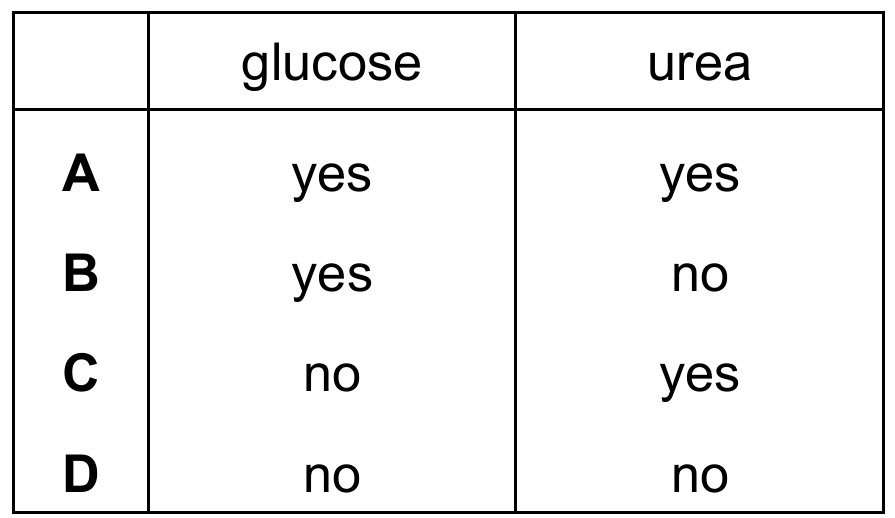Question
What is a role of the glomerulus?
(A) assembling amino acids into proteins
(B) filtration of water, glucose, urea and ions from the blood
(C) reabsorption of glucose, ions and water back into the blood
(D) removal of the nitrogen-containing part of amino acids to form urea
(B) filtration of water, glucose, urea and ions from the blood
(C) reabsorption of glucose, ions and water back into the blood
(D) removal of the nitrogen-containing part of amino acids to form urea
▶️ Answer/Explanation
The glomerulus is a network of capillaries located at the beginning of a nephron in the kidney. Its primary function is ultrafiltration; high blood pressure forces small molecules like water, glucose, urea, and ions through the capillary walls into the Bowman’s capsule. Larger structures, such as blood cells and proteins, are too big to pass through and remain in the blood. Choice (C) describes the function of the renal tubules, while (D) refers to deamination, which occurs in the liver. Therefore, the glomerulus acts specifically as the initial filter of the blood.
✅ Answer: (B)
✅ Answer: (B)
Question
What is filtered out of the blood in the glomerulus and into the nephron?

▶️ Answer/Explanation
Ultrafiltration occurs in the glomerulus, where high pressure forces small molecules out of the blood and into the Bowman’s capsule. This process is non-selective based on “usefulness” and instead depends on molecular size. Both glucose and urea are small enough to pass through the capillary walls and the basement membrane. While urea is a waste product and glucose is a nutrient, both enter the nephron as part of the initial filtrate. Later, $100\%$ of the glucose is typically reabsorbed in the proximal convoluted tubule, but at the point of filtration, both are present.
✅ Answer: (A)
✅ Answer: (A)
Question
In a healthy human, in which blood vessel would you find the lowest concentration of urea?
(A) hepatic artery
(B) hepatic vein
(C) renal artery
(D) renal vein
(B) hepatic vein
(C) renal artery
(D) renal vein
▶️ Answer/Explanation
To solve this, consider the organs where urea is produced and removed. Urea is synthesized in the liver, meaning the hepatic vein carries the highest concentration as it leaves the production site. Conversely, the kidneys are responsible for filtering urea out of the blood to be excreted as urine. The renal artery brings urea-rich blood into the kidneys, while the renal vein carries blood away after it has been filtered. Consequently, the blood in the renal vein has the lowest urea content in the entire body.
✅ Answer: (D)
